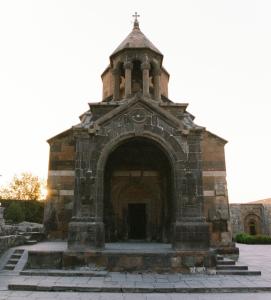The Problem with Theologians

When I discovered systematic theology, it was almost an instant thing that I wanted more. In the business world, there were systematic methodologies that drove quality and efficiency. If I could apply something like that to my quest for understanding God, then everything would be right in the world, and I would be able to share that with others. So, shortly thereafter, I finished my bachelor’s degree at a seminary and dove feet first into ministry.
Jesus never said to start a religion called Christianity, and he didn’t author a creed or belief system to follow. His message was simple: love your neighbor—do unto others—don’t “lord” over people. Many people today describe his message as a mystical approach to life: going inside, authenticity, and avoiding religion and its trappings.
The apostle Paul followed along later, having never met Jesus, and applied his business model to Jesus’ message. From my short, 20-year ministry experience, I understand his slant to be more of a legal methodology, rather than a mystical one, even though theologians keep trying to reinterpret Paul. His letters have been used by theologians throughout the years to justify misogyny, abuse, and all other manners of injustice.
Around the time of Paul, several others produced their interpretation of what Jesus was trying to say and what he did. A couple of historians mentioned Jesus, but only after decades of silence. There were varying schools of thought until centuries later religious people and the emperor decided there needed to be some control. So, they created the Canon of Scripture.
Fast forward to the Reformation, which was about 500 years ago. At this time, Protestantism was invented, and the Canon of scripture became a paper Pope. Now, there are tens of thousands of denominations that all believe they are right, and that God is on their side.
To make a long story short, I believe the problem is very simple. For over 2,000 years, Christians have decided to do something Jesus never said to do. They have decided to develop a theology based on the ancient book that was assembled over 300 years after Jesus lived. It seems that man believes that if they can boil everything down to a creed or a belief system, then everything will be right with the world. Just like the Jewish world at the time of Christ that believed if everyone would follow their law (as they interpreted it) then everything would be fine again. Even though Christianity started as a revolution, it failed when it attempted to become civilized.
This is a summary of why I believe theologians and theology we’re never the answer.
- It’s all based on an ancient, imperfect document.
The trouble with the Bible is that you can make it say whatever you want it to say. When someone discovers what they believe to be the new standard theology, people begin to copy the ideas and practices of that theology until another person comes along and develops a brand new one for the current age. Occasionally, there is a move back to the more ancient creed or belief system, thinking this will get us closer to the truth, but then another person or group discovers something brand new for a new generation.
I would argue against our quest for the perfect theology. I know that advancements sometimes happen inside of religion, but the heart of real change is from Mystics and those who would go inside and discover the universal truths that can’t be contained in a book, especially an imperfect one. Often, we discover these things in nature and from living authentic lives.
- Theologians are prone to power and greed.
Under this discussion, I just have a lot of questions. If there is a God that wants to be known, why didn’t they do a better job of revealing it? And, if Christianity and religion were supposed to happen, why are we still deeply divided and confused after 2000 years? And why, since the time of Constantine, have we elevated these people and paid them money, when we know that in a few decades, these theologies will give way to new ones?
In recent decades, it could even be proven that the most popular and highest-paid theologians were the ones who have created the most havoc and promoted the most destructive theologies. It comes down to the issue of trusting ourselves. Patriarchy is such an insidious thing that has been with us for so long, that most of us have a hard time believing we will ever move out of it. My current issue is with a group called the Theology Beer Camp. They may be a little more progressive and accepting of queer people, but they’re still infested with a lack of concern for abuse survivors and how they can profit from marketing their theology.
It simply keeps happening over and over again.
- They form organizations and create platforms.
Most Mystics that I have ever met are content to just experience the Divine and sometimes share their thoughts with others. Throughout the history of the Christian Church, the Mystics have been ignored and sometimes persecuted. But theologians are different. They generally love attention. Narcissism and ego are common characteristics of their behavior. They may be soft-spoken and amiable in person but watch what happens when they get on stage or have a chance to be famous, especially when you question them.
I realize that many of them are responding out of their unaddressed trauma, but it’s also the nature of an organization to protect the organization. So, whether it’s a church, a fraternal organization, a festival, or a beer club, the result is the same. When people are hurt or question the motives of the bigger group, the organization always comes first. Not only is there no time to address the trauma that people carry around, but when new trauma is introduced by the group, the preservation of the group is primary.
The show must go on!
I spent 20 to 25 years in ministry and even longer studying the Bible. But I still am no match, for arguing with a seminary professor or a pastor that preaches every Sunday. I am a simple guy who would prefer writing over speaking, and since my stroke, it has been hard for me to debate on a keyboard. I also understand that if a theologian reads this, they may wonder what my expectations of them are and how would I solve the problem. I realize what it feels like when you must consider changing what you do for a living and what you do for acceptance.
I think the first thing we must do is get rid of the platform. The stage causes all kinds of power differentials which opens us to all kinds of abuse and exalts our many weaknesses. I know that those of you who are on stage have worked very hard to get there, but most of the people in the audience have worked just as hard and never got the recognition. If you’re honest, you would admit that someone gave you a break because you had a friendship with them. Your insights may be compelling, but there are many people on the other side of the power dynamic who are just as smart and creative as you are. When Jesus said not to lord over people, he may have been referencing practices like the platform that elevates one person over another.
These are essentially my thoughts as I consider my journey from being an evangelical pastor to having inclinations of a more progressive minister, to leaving Christianity behind. You don’t have to agree with me, but I invite you to take a breath from defending your current system and see if there might be a better way. We can’t just keep creating systems that are essentially the same with a few nuances. We must have the courage to be intentional about truly evolving to a different level.
Be where you are,
Be who you are,
Be at peace!
Karl Forehand
A Treasure Trove of Trauma Resources
314 – Unmasking Patriarchy: Diagnosing Narcissism & Abuse
What’s Wrong with God’s Plan and Purpose?

Karl Forehand is a former pastor, podcaster, and award-winning author. His books include Out into the Desert, Leaning Forward, Apparent Faith: What Fatherhood Taught Me About the Father’s Heart, The Tea Shop and Being: A Journey Toward Presence and Authenticity. He is the creator of The Desert Sanctuary podcast and community. He is married to his wife Laura of 35 years and has one dog named Winston. His three children are grown and are beginning to multiply! You can read more about the author here

















